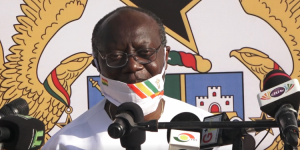The Finance Minister, Ken Ofori-Atta has defended the Electronic Transaction Levy proposed in the 2022 budget, saying it will help lift Ghana’s tax-to-GDP ratio to a level comparable to peer economies in the sub-region.
At around 12% in 2019 and 2020, and 13% in 2021, Ghana’s tax-to-GDP ratio remains far below the government’s target of 20% by 2023.
As part of efforts to raise the proportion of the country’s Gross Domestic Product, the Finance Minister in the 2022 budget statement revealed that a 1.75% tax will be slapped on electronic transactions beyond GH¢100 daily and more than GH¢ 3,000 monthly.
While delivering his speech as the guest speaker at the PWC 2022 budget digest, Mr. Ofori-Atta noted that the E-Levy was a necessary tool not just for raising Ghana’s tax-to GDP ratio but for supporting the government’s efforts at building an entrepreneurial country.
“Only 33.3% of employees contributed to income taxes, while 1.6% of self-employed individuals contributed to income taxes in 2019. These statistics are a poor reflection on the country and highlight the need for change in the narrative. We can’t continue to depend on only 8.2% of our citizens to carry the burden of 30.8 million of our people and also expect to transform the economy.”
“We are determined to enhance domestic revenue mobilization and set the nation on a path to building an entrepreneurial nation. In truth the E-Levy is a necessary tool to increase our tax-to-GDP ratio and support the thrust of the government’s direction in the medium term promoting entrepreneurship, and supporting our youth,” he added.







